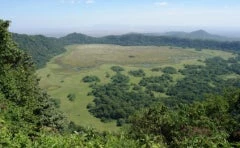
Or not. Ted Miguel’s keynote address at the annual conference of the Center for the Study of African Economies (CSAE) in Oxford highlighted a potentially important concern. Applying a common statistical framework to a large number of studies on the link between temperatures and human violence, Miguel and his co-authors find a remarkably consistent and strong correlation between exceptionally high temperatures and manifestations of violence. Drawing on detailed data from a variety of countries and studies, they show that exceptionally high temperatures are correlated with significant increases in witch killings (Tanzania), rapes (USA), murders (USA), aggressive behavior of baseball players (USA) and more frequent and more aggressive horn-honking.
Applying the model to civil wars, Miguel and his team find that a one standard deviation increase in temperatures is correlated with an 11 percent increase in civil war onsets. Average temperatures in Sub-Saharan Africa are forecasted to rise by two degrees Celsius by 2050. This represents an increase of three standard deviations. Applying the findings, this could increase civil war onsets by 33 percent. The link between high temperatures and war onsets is likely to run through the impact on economic conditions, as research shows that a one degree increase in temperatures is correlated with a 1.5 percentage point decrease in GDP growth.
So there would be a double negative effect: Temperature shocks would drive down economic indicators, which in turn would increase-in the well-known Collier-Hoeffler framework-the likelihood of conflict that would in turn have devastating impacts on the economy and the people.
Fortunately, there are a number of caveats. Miguel and coauthors examine the impact of temperature “shocks”, extreme deviations from the average, on violence. An increase in temperature of two degrees Celsius over a 50-year period (0.05 degrees per year) is probably not a “shock”. This caveat would however cancel out if higher average temperatures were to be correlated with more frequent and steeper temperature swings). Also, given the time-period we would expect African countries to adapt and put policies in place to mitigate the impact of rising temperatures (although some African Governments will do so better and faster than others).
What do you think? What will be the impact of global warming on Africa’s future?
Miguel’s address can be watched here. See also Markus Goldstein’s post on the subject here.


Join the Conversation